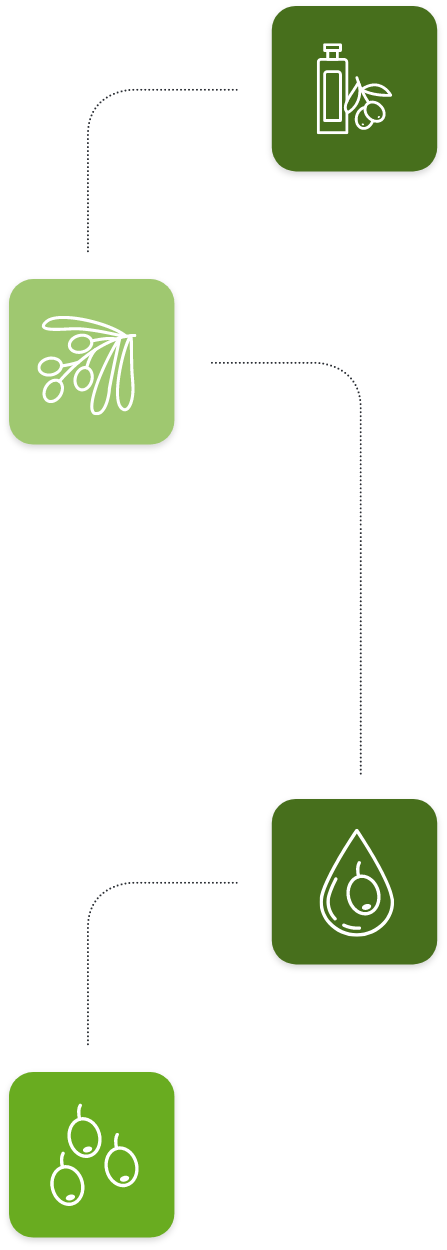ABOUT US
Master olive growers
since 1898
Aceitunas Torrent, a family business from Cordoba (Andalusia)
We produce and market table olives with a presence in more than 80 countries. We take care of the entire process, from the harvesting of the olives to their delivery to the customer, coordinating the preparing, packaging, transport and distribution of the product.
Founded in 1898 by Francisco Torrent Terol, we have evolved from manufacturing barrels to being world leaders in table olives. With the fourth generation at the helm, we are synonymous with quality and guarantee, combining tradition and innovation in our brands, from classic olives to the most innovative formats. Adapting to the needs of international customers, our passion for the olive tree is reflected in all our products. Discover the world of Torrent.
We are located in Cordoba, Andalusia, and we export to every corner of the world. At Aceitunas Torrent we are not only dedicated to selling olives. We provide a complete service. With an important logistical system, we coordinate from start to finish the chain of olive harvesting, dressing, packaging, transport and distribution of the product from the moment it leaves our factory until it reaches the customer. From the land to your door.
Our history dates back to 1898, the year in which Francisco Torrent Terol began to manufacture and market barrels for the storage of olive oil and olives. Shortly afterwards, we focused on table olives and, today, we are one of the world leaders in the production and marketing of table olives.
We are led by the fourth generation, and the years of experience behind us have made us a company known for being synonymous with quality and guarantee.
Tradition and innovation define us. And this is reflected in each of our brands. From the most classic olives to gourmet or flavoured olives. Our exporting character has led us to adapt to the needs of our customers in any market.
HISTORY
125 YEARS
OF LEADERSHIP
The history of a leading company in olive exports
From family tradition to worldwide recognition: Our legacy of passion and dedication in every olive.
1898
1898
1914
1914
1920
1920
1950
1950
1972
1972
1998
1998
2001
2001
2007
2007
2014
2014
2015
2015
2016
2016
2017
2017
2018
2018
2020
2020
2021
2021
MISSION, VISION AND VALUES
FOUR GENERATIONS
WITH A SINGLE PASSION

MISSION
Aceitunas Torrent’s mission is to offer our customers the best service. To achieve this, we offer them a unique product, whose value and quality are our main reference. In addition, we are always faithful to our Ten Commitment Dos and Don’ts.

Vision
‘To be the best version of ourselves’. That is the goal to which we constantly aspire. The means to achieve the company's maximum potential and ensure its renewal are the professionalisation of our processes and services at all times.

Values
Commitment, excellence, perseverance, integrity, creativity and teamwork are just some of the adjectives that define us. These values mark our business philosophy and, therefore, reflect the way we work on a daily basis.
HIGHLIGHTS
A
SKETCH
OF OUR HISTORY
‘A century contemplates us’.
By Francisco Torrent Béjar, 1898-1998
Olive consumption
is soaring
According to data published by the International Olive Oil Council (IOC), world consumption over the last 25 years has increased 2.8 fold, going up by 173% during the period between 1990/91 and 2015/16. Specifically, 2.61 million tonnes were consumed. Europeans are most fond of olives, especially Spaniards, Italians, Turks, Egyptians and North Americans.
Measuring system
Today, the old tradition, of Andalusian origin, of valuing and measuring olives by the number of kernels that make up a unit weight, still persists. In other words, olives are still classified by size (calibre), according to the number of fruits that fit per kilogramme.
The measurement system used today takes kilogrammes as the starting point, but in former times pounds were used, and in more ancient times, in Moorish times, in each ‘arrate’. Gordal olives were measured ten by ten grains, starting at seventy grains per kilo, while Manzanilla and Hojiblanca olives were measured twenty by twenty, of five types each, from 160 to 180 grains per kilo, up to the minimum valuation of 420 to 440 grains per kilo.

First export
of Spanish olives,
in the 16th century
The cultivation of the olive, gordal or manzanillo, continues today the age-old tradition of the archaic agricultural cultures of the Baetica, the Romans and the Arab-Andalusians. Nevertheless, the Spanish table olive may well have had its oar when, at the beginning of the 16th century, it began to be exported to the New World.
We know a deed from the Sevillian Protocols archive (9 December 1510) which records the first export to the Indies.
“Diego Rodríguez Pepino, a resident of Triana, master of the ship ‘Santiago’, charters the said ship to Diego Martínez, a resident of Villalba de Alcor, to load four tons on it, three tons of wine in pipes, a quarter of olives and the rest of fruit, bound for the port of Santo Domingo, on the ‘Española’”.
Hojiblanca
Its name is determined by the white colour of the underside of the leaf of the olive tree of this variety, which was forbidden to be exported as a table olive in the 1950s. History had it that olives that were not in the shadow of the Giralda were not suitable for the table.
It was not until the 1965-1966 season that exporters in the province of Cordoba and Malaga, who were registered in the Special Register of Green Olive Exporters, were authorised to export 500,000 kilos of Hojiblanca olives exclusively to the United States and Canadian markets.
Máximo Torrent was already aware of the potential of Hojiblanca olives, the main variety with which Aceitunas Torrent works today and which currently ranks first in terms of kilos produced and exported for the consumption of table olives of all commercial varieties.
DESTACADOS
A
SKETCH
OF OUR HISTORY
‘A century contemplates us’. By Francisco Torrent Béjar, 1898-1998

Olive consumption is soaring
According to data published by the International Olive Oil Council (IOC), world consumption over the last 25 years has increased 2.8 fold, going up by 173% during the period between 1990/91 and 2015/16. Specifically, 2.61 million tonnes were consumed. Europeans are most fond of olives, especially Spaniards, Italians, Turks, Egyptians and North Americans.

Measuring system
Today, the old tradition, of Andalusian origin, of valuing and measuring olives by the number of kernels that make up a unit weight, still persists. In other words, olives are still classified by size (calibre), according to the number of fruits that fit per kilogramme.
The measurement system used today takes kilogrammes as the starting point, but in former times pounds were used, and in more ancient times, in Moorish times, in each ‘arrate’. Gordal olives were measured ten by ten grains, starting at seventy grains per kilo, while Manzanilla and Hojiblanca olives were measured twenty by twenty, of five types each, from 160 to 180 grains per kilo, up to the minimum valuation of 420 to 440 grains per kilo.

First export of Spanish olives, in the 16th century
The cultivation of the olive, gordal or manzanillo, continues today the age-old tradition of the archaic agricultural cultures of the Baetica, the Romans and the Arab-Andalusians. Nevertheless, the Spanish table olive may well have had its oar when, at the beginning of the 16th century, it began to be exported to the New World.
We know a deed from the Sevillian Protocols archive (9 December 1510) which records the first export to the Indies.
“Diego Rodríguez Pepino, a resident of Triana, master of the ship ‘Santiago’, charters the said ship to Diego Martínez, a resident of Villalba de Alcor, to load four tons on it, three tons of wine in pipes, a quarter of olives and the rest of fruit, bound for the port of Santo Domingo, on the ‘Española’”.

Hojiblanca
Its name is determined by the white colour of the underside of the leaf of the olive tree of this variety, which was forbidden to be exported as a table olive in the 1950s. History had it that olives that were not in the shadow of the Giralda were not suitable for the table.
It was not until the 1965-1966 season that exporters in the province of Cordoba and Malaga, who were registered in the Special Register of Green Olive Exporters, were authorised to export 500,000 kilos of Hojiblanca olives exclusively to the United States and Canadian markets.
Máximo Torrent was already aware of the potential of Hojiblanca olives, the main variety with which Aceitunas Torrent works today and which currently ranks first in terms of kilos produced and exported for the consumption of table olives of all commercial varieties.
FACILITIES
LEGACY
CORDOVAN
Since 1998, Aceitunas Torrent has been located in the Polígono Industrial Norte de Aguilar de la Frontera (Córdoba), a complex of 100,000 square metres where both our factory and the company's head office are located.

Office
Aceitunas Torrent has offices in Aguilar de la Frontera and in the capital of Cordoba, where its head office is located.

Factory
Our facilities include areas for storage, preparing, packaging, sorting, oxidation, pitting, warehouses, laboratory and a purification plant.

Farms
The company has more than 150 hectares of olive farms in the Genil-Cabra area, the Patamulo and Trueno estates. An enclave in the southern countryside of Cordoba, the birthplace of the Hojiblanca olive.






